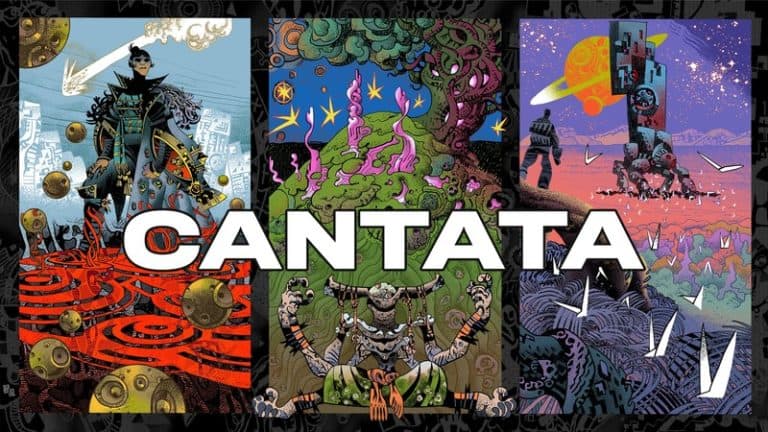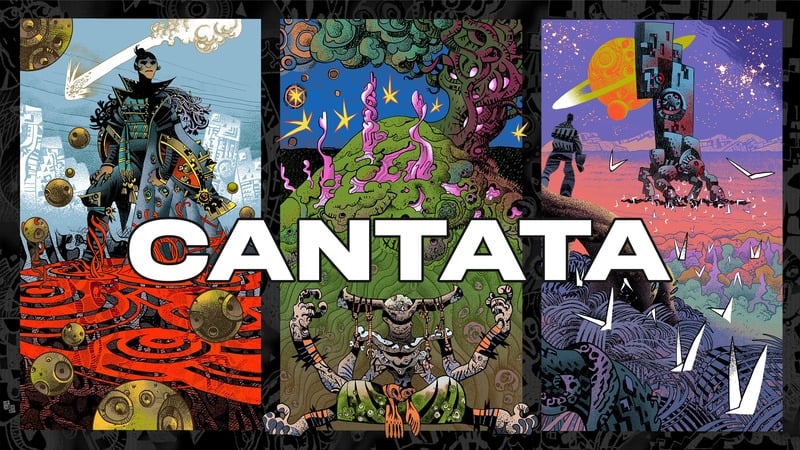Afterschool Studio’s Cantata is bringing strategy to the stars, layering gorgeous, suitably otherworldly art over crunchy, immensely satisfying tactical gameplay. Out now in early access, Cantata presents a mix of classic RTS building, recruiting and resource generation, combined with grid-based turn-by-turn combat. This is a potent mixture, the bare bones of which is likely to be familiar to anyone that has played Nintendo’s Advance Wars franchise. But while that beloved series made its Saturday Morning Geopolitics digestible through a downright cute round-edges aesthetic, Cantata’s design is headier, stranger and more intriguing.
Cantata: Space, Art and Grids

One of the first things you notice playing Cantata is just how striking and unique it is to look at. The game’s combination of intricately crafted pixel art and a dreamy sci-fi aesthetic brings to mind Yoshitaka Amano’s ethereal brushwork translated into the chunky sprites of the original Final Fantasy games. But while that interpretation was somewhat stifled by being filtered through the technology of the time, Cantata’s combination of art styles comes not from concession, but honing in on a carefully crafted aesthetic. For a genre occasionally accused of feeling sterile, Cantata injects a welcome dose of weirdness and personality.
To continue the Final Fantasy comparisons, Cantata brings nothing so much to mind as Final Fantasy Tactics. Gorgeous diorama-esque battlefields, simple yet no-less-stunning pixel models and painterly character portraits, all deployed in service of an intricate tale of clashing factions and overlapping motives. While strategic gameplay makes up the bones, wires and vines coursing through the body of Cantata, the game’s outward presentation is so appealing that it is almost worth the price of admission by itself.
In the Pipeline

Thankfully, Cantata doesn’t deploy its pretty face in service of disguising shallow game mechanics. There’s some real depth to Cantata, enough to perhaps prove daunting to those looking for nothing more than fun, flashy skirmishes.
Even as early as the tutorial, Cantata emphasises that matches won’t be won through speed and strength alone. Reinforcements, supplies and retaining control over areas as you progress are crucial. Creating a steady flow of resources between buildings is not only essential to creating your most useful units and structures. It is also crucial to allowing your units to traverse the map in a timely manner. Your production network is key to your success in Cantata, as you expand your web of force and influence across the surface of the planet Shoal.
If there is a downside to this, it is that even shorter, earlier missions of Cantata can tend to drag on. For those that love the nitty-gritty side of the genre, you’ll be all too happy to get entrenched and eke out a victory after lengthy engagements. But for players looking for quicker, pulse-pounding missions, Cantata’s more languid pace may take some getting used to.
From Scrap to Salvos
Cantata’s thoroughness and mechanical attention to detail extends throughout all aspects of its gameplay, with the game’s tech trees being a prime example. Despite earlier comparisons to Advance Wars, there’s no instant menu of units to choose from here. You’ll be working your way up through your factions’ constituent parts before bringing them together into mighty war machines. Rather than dropping cannons and gunships onto the battlefield fully formed, you’ll first be securing a steady influx of alloys, engines, fuel and more to form a production network. And that’s just for the Reign, Cantata’s first playable faction.
Each faction is differentiated from the others not only in its story and personality but its mechanics. These changes don’t just end at the units available. The infrastructure and tech tree of each faction is wholly unique, really driving home the clashing styles and sensibilities of each group. Cantata provides a whole lot to dive into here, and there’s a very specific form of satisfaction that comes from perfecting every aspect of your fighting force, building it up from nothing into a map-swarming menace.
Resource management
One of Cantata’s most intriguing mechanics is the way in which its resource generation is handled. As is often the case in this style of strategy game, your bases generate specific resources which can be consumed and converted to aid further building and recruiting. The strength of your forces often depends on your capacity to generate enough resources to keep up the pace of your map-wide expansion.
In Cantata, buildings do not simply generate resources out of nothing, to put into limitless projects of your choice. Instead, resource-generating buildings take from the Global Supply, an element that you are given a stockpile of at the start of every mission and can acquire further limited amounts of mid-mission, through discovering and converting resource nodes. Rather than buildings generating a flat amount of individual resources per turn, you are able to modify the rate at which the Global Supply is converted, giving you a degree of flexibility and freedom over how you choose to allocate your dwindling stockpile. It is up to you to consider how best to use the global supply on a moment-to-moment basis, remaining aware of the fact that at a certain point, all you’ve got is all you’ll get.
This is some of Cantata’s strongest interweaving of theme and mechanics. Resource conversion and the Global Supply serves as an intriguing gameplay layer to keep track of on its own, preventing you from running roughshod over any enemy faction through sheer overwhelming numbers. But it also fits with narrative elements that have begun to emerge within the game’s first few chapters. A planet’s resources being drained and carved up to fuel a conflict it plays unwilling host to, or an empire throwing away men and money in a pride-skewed bloodbath.
And in case this all sounds a little limiting or frustrating, Cantata is much more liberal with the other resources it hands to its players. One of the game’s most integral mechanics is Surging; using a turn-by-turn resource to expand beyond your usual capacity, taking additional movements and actions when they are most crucial. Unlike the Global Supply, the Action Points used to Surge refresh every turn, so it’s never a question of whether to surge or not, just where the points will be best spent. So while Cantata places certain limits on your ability to expand your forces, you have a large amount of control over what you do with those forces once you’ve earned them.
Building Characters, Destroying Worlds

Cantata’s unique personality is not only established through its offbeat, vibrant art, but in its individual factions and characters. Cantata offers three main factions, each with their own goals, culture and reasons for fighting to the death on the battleground that Shoal has swiftly become.
You are first placed in control of The 111th Reign of Harmony and Prosper – the human empire cutting a swathe across the galaxy in pursuit of rebel machines. In later missions, you will have chance to play as the machines themselves; The United Spirit, recently taking up refuge on Shoal. Seemingly to hide from the Reign’s onslaught, but perhaps instead to find some method of gaining the upper hand. And lastly, The People of Sun and Shadow, the native life forms of Shoal, seeking deadly revenge for the ecological devastation caused by the interlopers’ crossfire. Each faction feels fleshed out and intriguing, hinting at a whole universe of depth and conflict within just a few lines.
Cantata’s writing is sharp and flavourful. Afterschool Studios invoke Ann Leckie as an inspiration, and the author’s ability to hone in on uniquely intriguing viewpoints and narrators is an area in which Cantata also shines. By the time chapter three rolls around, you’ve gone from the perspective of a human dynast to a machine platform housing ten separate intelligences, with a brief stop at a vengeful warrior of nature in between.
Battlefield Betrayal

The interplay between each faction is well handled from both a narrative and gameplay perspective. Switching faction POV between each chapter affords a breadth and depth to the conflict raging across Shoal, with each chapter so far serving to add new narrative layers and complement those already introduced. Playing as The People of Sun and Shadow in chapter two, you are immediately tasked with cutting down the same faction that you just spent time guiding to victory. The time you spent as The Reign has given you knowledge of their strengths and weaknesses, allowing you to exploit their shortcomings and brace for when conditions are favourable to them, ensuring that the transition to a new faction is not too jarring.
Some players may wish for the option to play as whichever faction they wish right from the off, and in a way, they are in luck. The three chapters available so far can be started and played in any order. But Cantata’s narrative so far seems as intriguing as its unique gameplay, and the clearest picture of that story is provided by playing the chapters in the order in which they are presented.
Cantata: Worth playing in early access?
In its current state, the first three chapters of Cantata are available to be played, as well the beginnings of a robust mapmaker and matchmaking system. While nine chapters are planned for the eventual full release, the three currently available chapters are packed with depth and variety. Cantata’s unique narrative viewpoints, deep combat, resource management and outstanding style are more than enough to recommend in their current state. Get in on the game as quick as you can, and by the time all of Cantata is ready for a full release, we could be in for something quite special indeed.






